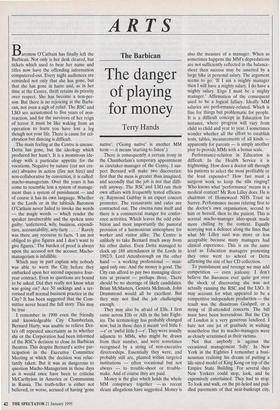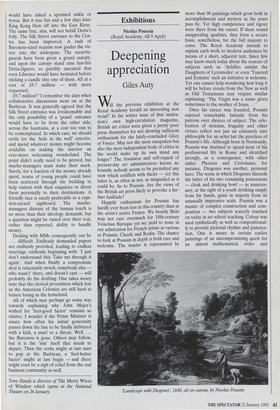ARTS
The Barbican
The danger of playing for money
Terry Hands
Baroness O'Cathain has finally left the Barbican. Not only is her desk cleared, but tickets which used to bear her name and titles now have the offending information computered-out. Every night audiences are reminded not only that she has gone, but that she has gone in haste and, as in her time at the Centre, thrift retains its priority over respect. She has become a non-per- son. But there is no rejoicing at the Barbi- can, not even a sigh of relief. The RSC and LSO are accustomed to five years of non- reaction, and for the survivors of her reign of terror it must be like waking from an operation to learn you have lost a leg though not your life. There is cause for cel- ebration but dancing is difficult.
The main feeling at the Centre is unease. Detta has gone, but the ideology which produced her hasn't. It is a monstrous ide- ology with a particular appetite for the vocations. Negative by nature (cut not cre- ate) abrasive in action (fire not hire) and non-collaborative by conviction, it is called: macho-managerism. Over the years it has come to resemble less a system of manage- ment than a system of punishment — and of course it has its own language. Whether in the Lords or in the tabloids Baroness O'Cathain never failed to invoke the words — the magic words — which render the speaker invulnerable and the spoken unto guilty: 'unfettered, wily, business, expendi- ture, accountability, arty-farty . . . . ' Rarely was there any recourse to facts. 'I am not obliged to give figures and I don't want to give figures.' The burden of proof is always upon the accused not the accuser. Macho- managerism is infallible.
Which may in part explain why nobody was able to warn the City before they embarked upon her second expensive four- year contract. Even so questions are bound to be asked. Did they really not know what was going on? Are 50 sackings and a ter- rorised staff normal business practice in the City? It has been suggested that the Com- mittee never heard the full story. This may be true I remember in 1990 even the friendly and knowledgeable City Chamberlain, Bernard Harty, was unable to relieve Det- ta's oft repeated uncertainty as to whether she or the Corporation had been informed of the RSC's decision to close its Barbican theatres. This despite Bernard's active par- ticipation in the Executive Committee Meeting at which the decision was reluc- tantly taken. But it was as dangerous to question Macho-Managerism in those days as it would once have been to criticise McCarthyism in America or Communism in Russia. The truth-teller is either not believed, or worse, accused of having 'gone native'. (`Going native' is another MM term — it means 'starting to listen'.) There is consequently a certain irony in the Chamberlain's temporary appointment as caretaker-manager of the Centre. I sus- pect Bernard will make two discoveries: first that the mess is greater than imagined, and secondly that the job is not that diffi- cult anyway. The RSC and LSO run their own affairs with frequently tested efficien- cy. Raymond Gubbay is an expert concert promoter. The restaurants and cafes are contracted out. The cinema runs itself and there is a commercial manger for confer- ence activities. Which leaves the odd exhi- bition and most importantly the pastoral provision of a harmonious atmosphere for worker and visitor alike. The Centre is unlikely to take Bernard much away from his other duties. Even Detta managed to clock up 169 attendances in the Lords in 1992/3. Lord Attenborough on the other hand — a working professional — man- aged only one. And the money is good. The City can afford to pay two managing direc- tors at present — perhaps three. There should be no shortage of likely candidates. Brian McMasters, Genista McIntosh, John Drummond would all be excellent. But they may not find the job challenging enough.
They may also be afraid of Elfs. I first came across Elfs or Alfs in the late Eight- ies. The terminology has probably changed now, but in those days it meant 'evil little or 'awful little They were usually adjuncts to MMs, who might be drawn from their number, and were sometimes recognised by a string of non-executive directorships. Essentially they were, and probably still are, planted within targeted institutions — often vocational but not always — to trouble-shoot or trouble- make. And of course they are paid.
Money is the glue which holds the whole MM conspiracy together — as recent sleaze allegations have suggested. Money is also the measure of a manager. When as sometimes happens the MM's depredations are not sufficiently reflected in the balance- sheet then success may be asserted by a large hike in personal salary. The argument seems to go: 'If I am a mighty manager then I will have a mighty salary. I do have a mighty salary. Ergo I must be a mighty manager.' Affirmation of the consequent used to be a logical fallacy. Ideally MM salaries are performance-related. Which is fine for things but problematic for people. It is a difficult concept in Education for instance, where progress will vary from child to child and year to year. I sometimes wonder whether all the effort to establish tests, tables, measurements of all kinds apparently for parents — is simply another ploy to provide MMs with a bonus scale.
Performance-relation in Education is difficult. In the Health Service it is frightening. How does a doctor sift through his patients to select the most profitable or the least expensive? How fast must a surgeon work to keep the tills ringing? Who knows what 'performance' means in a medical context? Mr Ron Lilley does. He is chairman of Homewood NHS Trust in Surrey. Performance means relating first to the doctor's own organisation, second to him or herself, then to the patient. This is normal macho-manager idea-speak made more chilling by the context. Equally worrying was a defence along the lines that what Mr Lilley said was more or less acceptable because many managers had clinical experience. This is on the same level as Education managers protesting they once went to school or Detta affirming the size of her CD collection.
To punishment and revenge we may add competition — even jealousy. I don't believe the Baroness ever quite got over the shock of discovering she was not actually running the RSC and the LSO. It may account for what appeared to be a competitive independent production — the result was the disastrous Godspell, or a string of ill-attended concerts. The bill must have been horrendous. But the City of London is a very generous landlord. I bate not one jot of gratitude in wishing nonetheless that its macho-managers were as closely scrutinised as their victims.
Not that anybody is against the occasional management 'folly'. In New York in the Eighties I remember a busi- nessman realising his dream of putting a life-sized model of King Kong on top of the Empire State Building. For several days New Yorkers could stop, look, and be expensively entertained. They had to stop. To look and walk, on the pit-holed and pud- dled pavements of that near-bankrupt city, would have risked a sprained ankle or worse. But it was fun and a few days later King Kong blew off into the East River. The same fate, alas, will not befall Delta's folly. The Silk Street entrance to the Cen- tre has been improved. A rash of Baroness-sized sequins now guides the vis- itor into the underpass. The security- guards have been given a grand canopy, and upon the canopy stand nine fun-fair Detta-figures, so garishly executed that even Liberate would have hesitated before sticking a candle into one of them. All at a cost of £9.7 million — with more requested.
£9.7 million!? I remember the days when collaborative discussions went on at the Barbican. It was generally agreed that the Silk Street entrance was irredeemable and the only possibility of a 'grand' entrance would have to be from the other side, across the fountains, at a cost too vast to be contemplated. In which case, we should settle for the `hole in the wall' exterior, and spend whatever money might become available on making the interior an ever-more welcoming wonderland. The point didn't really need to be proved, but macho-managers must make their mark. Surely, for a fraction of the money already spent, teams of young people could have been scattered through the building to help visitors with their enquiries or direct them personally to their destinations. A friendly face is surely preferable to a cupi- don-cursed signboard. The macho- managers distrust of the human touch is no more than their ideology demands, but a question might be raised over their real, rather than reported, ability to handle money.
Dealing with MMs consequently can be . . . difficult. Endlessly demanded papers are endlessly provided, leading to endless meetings, endlessly beginning with: 'I just don't understand this. Take me through it again'. And when finally a compromise deal is reluctantly struck, somebody else who wasn't' there, and doesn't care — will probably do the drafting. One takes weary note that the clerical procedures which lost us the American Colonies are still hard at leisure losing us the homeland.
All of which may perhaps go some way towards explaining why John Major's wished for 'feel-good factor' remains so elusive. I wonder if the Prime Minister is aware how often his initial generosity passes down the line to be finally delivered with a kick, a snarl or a threat. Well . . . the Baroness is gone. Others may follow, but it is the 'ism' itself that needs to depart. Then the corks might at last start to pop at the Barbican, a 'feel-better factor' might at last begin — and there might even be a sigh of relief from the real business community as well.
Terry Hands is director of The Merry Wives of Windsor which opens at the National Theatre on 26 January.



























































 Previous page
Previous page